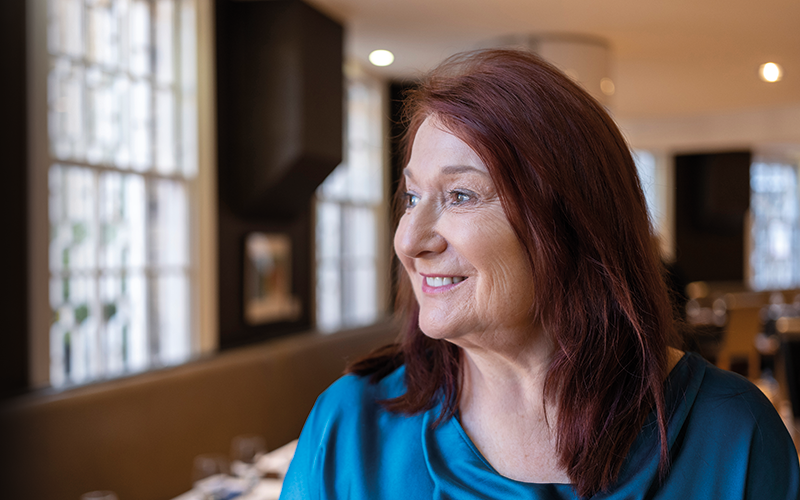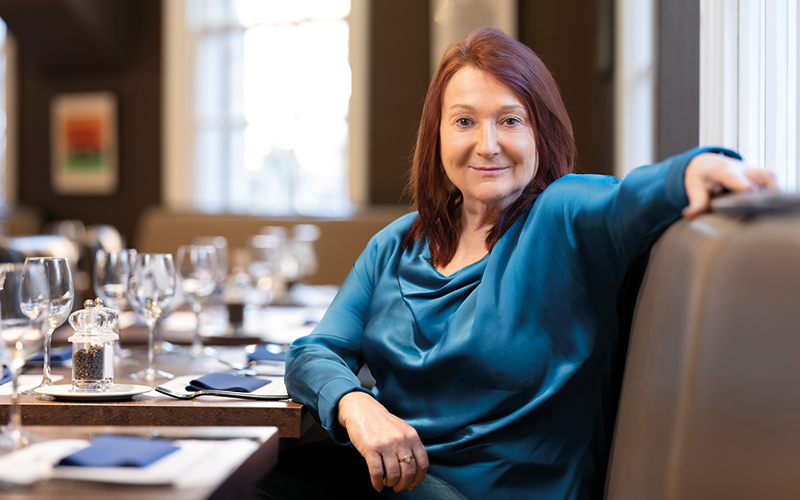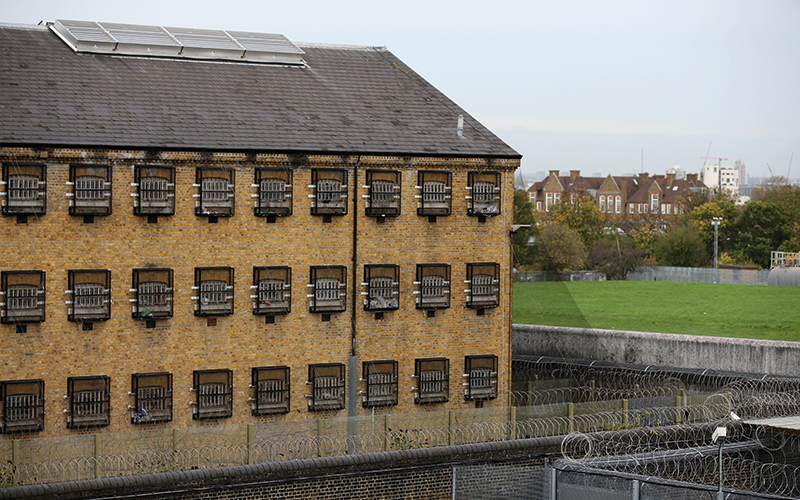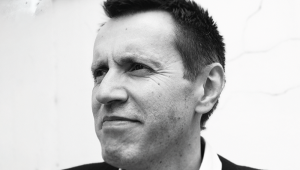
Reoffending is a blight that affects everyone involved – the victims, society at large, the reoffenders themselves and the public sector that deals with the case. The Ministry of Justice estimates that reoffending (defined as subsequent offences within 12 months of a conviction or release from custody) costs the economy £18.1bn – about half of which is from theft reoffences.
The key to getting this figure down is fairly obvious, Yvonne Thomas tells PF. She is chief executive of The Clink Charity, which works in prisons to give prisoners formal qualifications and experience working in hospitality, whether in one of the charity’s three restaurants, a prison kitchen or its event catering business. She says people need structure, opportunities and support – all of which are provided by The Clink and services like it.
We are in The Clink’s stylish restaurant at HMP Brixton, soundtracked by lounge music and the noises of the establishment preparing for service. During the interview, various treats are brought to the counter from the bakery – recently opened in the long-disused site of Gordon Ramsay’s Bad Boys Bakery, set up for his 2012 programme Gordon Behind Bars. Drawn portraits of Nelson Mandela and Malcolm X sit on the walls, alongside pictures provided by the Koestler Trust, which helps ex-offenders and prisoners to produce art.
Traineeship at The Clink is about more than just keeping prisoners busy – it’s about preparing for life and a career ‘on the outside’. “The first thing is that we don’t simulate a work environment; we run a real work environment,” says Thomas. “It really prepares people for life out of prison. We have interviews, a dress code, an attendance code – the trainees are subject to everything you would expect an employee to be subject to.”
Starting over
Graduates, imbued with a sense of purpose and responsibility, and with a framework for a new life outside prison, are far less likely to reoffend than average ex-prisoners. The Clink provides each graduate with a support worker, who meets with them between three and six months ahead of their release and supports them indefinitely, as long as they need support, in areas such as benefits, housing, job applications and reintegration into society.
“We try to ease people’s transition, to help support them when they need to start making different choices than the ones that got them into prison in the first place,” says Thomas. “If you have been in prison for 10 years, you come out and the world has changed. That can take some adjustment, and it isn’t always easy. The people who train with us are achieving a qualification, often for the first time, and it’s a really down-to-earth training environment. These men and women have often not really attended school. The sense of achievement and self-worth and self-respect that this builds shouldn’t be underestimated.”

The results speak for themselves. A 2020 report from RBB Economics found that, from 2010 to 2016, Clink graduates reoffended at a rate of 0.46 reoffences per individual, compared with 0.63 in the comparison group. Combined with Home Office figures suggesting a cost of at least £111,000 per reoffence (implying an average benefit of at least £18,900 from every person who graduates) and an estimated cost of £3,900 per individual trained, this means that, overall, The Clink saves £4.80 for every £1 spent.
The report also suggested that because The Clink works exclusively with prisoners, rather than offenders with non-custodial sentences, the true figure might in fact be even higher.
“It’s an investment,” explains Thomas. “Even on pure economic grounds, it makes sense. Bearing in mind that the cost of a prison place is about £45,000 per year, wouldn’t it be more sensible to use that money to stop people coming to prison in the first place? Also, how do you count the cost of avoided future victims? You can’t put a price on that, can you?”
She says other charities are doing similar things, and also achieving results. She names Bounce Back, whose focus is on training and helping ex-offenders into employment, and Catch22, which runs intervention services in communities as well as custody to help people make positive changes to their lives. “Our models are proven to work. All of us are making a significant difference,” says Thomas. “People can be helped in this way, and if you can help those people you can probably stop about half of them from reoffending.”
So, presumably, politicians are champing at the bit to fund services like this? Doesn’t the potentially immense benefit to public finances, let alone to the lives of the people involved, leave them no other option? Apparently not.
The Clink isn’t given anywhere near the support it needs from Westminster, says Thomas. About 15% of its budget comes from government grants, with the rest coming from charitable donations, a charitable foundation and revenue from some of its activities, such as the restaurants. She says The Clink has a “very good relationship” with the Ministry of Justice, but it is not civil servants who make the big calls on funding.
“Ultimately, whatever political policies are in place are the ones they have to implement,” she says. “We have had public support from the secretary of state for justice. He’s very complimentary about what we do, but that’s not followed up with money to help us do it sustainably.” So why not? “It’s just not a headline-grabber,” Thomas reasons.
The criminal justice system could really use the help, however. Reoffending rates generally have declined over the past few years, although they are still pretty high. But the problems in the system go far beyond just reoffending. Covid-19 and the impact of lockdown restrictions left services running at terrible levels.
“It’s not just the pandemic,” says Thomas. “The prisons system has been under pressure for years. The staffing issues have been there for years. And money has been tight across all parts of the criminal justice system. The effect in a prison is that people don’t get trained, [or] supported to make different choices. It’s an own-goal not to invest in prison staff and services like ours that support rehabilitation, but that’s where we are.”
The Clink’s finances are also far from where Thomas wants them to be. She says the charitable foundation will run out in about 18 months’ time, at which point it will need to either be re-funded or closed. Setbacks such as the charity experienced in Cardiff don’t help. The Clink restaurant at HMP Cardiff was forced to close at the end of 2022 after 10 years of running, because its lease was not extended. “That was so sad,” says Thomas. “It was our biggest training site, as it included people on probation as well people from prison, who were bussed in from HMP Prescoed.”

Looking to the future
So, what next? “We have sufficient training places across the estate to train 750 people over a year. Extending restaurant opening hours would allow us to train more people. The market for customers seems to be holding up,” she says. Another events business is on the cards, and there’s ambition to open a restaurant in the North (“maybe Leeds or Durham”), and to return to Cardiff with a community facility – “we feel being absent from Wales isn’t fair for people leaving prison there,” Thomas says.
But there is also work to be done at the existing sites. “We’re working on filling our training places. I want to prove that The Clink Charity can provide training cost-effectively with brilliant outcomes, so we can make an even better case for providing our services.”
The case is already being made, though, and, despite the results, the support from Westminster is just not enough, adds Thomas. Time and time again, she says, the government refuses to fund a sensible, provably effective solution to a problem in society that it says it cares about. The Clink is one such example, and finding a sustainable way to allow it to carry out its work would help not just to save money but also to make the lives of some of the people its work touches indescribably better.


















